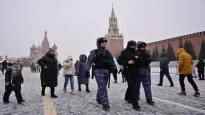MOSCOW In Russia, you hardly see a dark anniversary. Those in power have no particular reason to emphasize that the war of aggression in Ukraine has been going on for a year already, even though it was originally supposed to be a lightning-fast operation.
Of course, the so-called military special operation has been on display all week: it was filled by the president Vladimir Putin line speech on Tuesday, it was celebrated in a patriotic concert at the Luzhniki Stadium in Moscow on Wednesday, and on Thursday it was commemorated on Defender of the Fatherland Day, a holiday for members of the armed forces.
On the other hand, the anniversary of the beginning of the offensive operation is hardly visible in the Russian state media. Recently, the Russian leadership has not had any great successes on the battlefields to show for it.
Maybe it was hoped that this week the people could be told about the seizure of the town of Bahmut in Ukraine, but the men of the mercenary company Wagner only say that they were able to seize a village near the town.
The more has belonged to Wagner’s founder Yevgeny Prigozhin accusation that the Ministry of Defense has not supplied his soldiers with ammunition. It can’t be considered mood-boosting content.
In Moscow, people have brought flowers Ukrainian poet Lesja Ukrainkan to the monument and in St. Petersburg of the national poet of Ukraine Taras Shevchenko to the statue.
The police were there and made arrests in both Moscow and St. Petersburg, citing, among other things, the corona restrictions.
Different cities have an anniversary reported (you switch to another service) more than 20 arrests in total.
In February-March, after the attack started and in late September after the announcement of the movement, there were quite large demonstrations in Russia, but otherwise the authorities have been able to suppress the protest. The war has given the state’s violence machinery an even freer hand.
Still, it is rare that a person takes an anti-war sign, goes to a public place with it and gets arrested.
In opinion polls, the majority of Russians has expressed his support for a “military special operation”. It is questionable to what extent people will respond openly in the current climate in Russia.
In any case, the support of the great majority seems passive, and the war does not seem to have raised such a patriotic high as the occupation of Crimea in 2014.
The launch brought the war concretely to the skin of many Russians. It was visible from the Levada center in opinion polls (you switch to another service) as the steepest drop in sentiment since 1998. Hundreds of thousands of Russians fled the country.
Interestingly, the moods in the polls leveled off very quickly. The threat of a new wave of movement has not disappeared, but it no longer seems to cause the same kind of active anxiety.
It could be that people live from day to day. The future is dim, so it’s easier not to think about it.
Author Dashiell Hammett wrote in one of his novels about a man who almost gets hit by a falling steel beam from a construction site. Horrified by the insane randomness of life, a man leaves his former life, family, work and possessions and disappears. Two years later, a private detective finds a man: he has started a new family and settled down to live an almost identical exact life.
– He got used to the steel beams falling and then when they stopped falling, he got used to them not falling, says the storyteller dryly.
Maybe in the same way many Russians first got used to the possibility that a call to action could come at any moment, and now they are used to the fact that it may not come at all.
For a large part of Russians, the war is still far away, and it seems to some extent normalized to the background of everyday life. That doesn’t mean it doesn’t distress people.
Some kind of fatigue is also indicated by the fact that about 50 percent of the respondents in Levada’s surveys has paid off (you switch to another service) ceasefire and peace talks.
Many citizens also hoped for peace near the Luzhniki stadium on Wednesday, although the crowd going to the patriotic concert expressed their strong confidence in the president.
Those in power must be thinking carefully, is there a reason for a new wave of mobilization or can crew losses be compensated for in some other way in the future.
As a decision maker, Putin is often a procrastinator. He delayed for a very long time already the issuing of the original business launch order.
He does not like to make personnel changes in his administration. So the Minister of Defense Sergei Shoigu and the Chief of the General Staff, Gen Valery Gerasimov have maintained their position, even though the war has progressed sluggishly.
